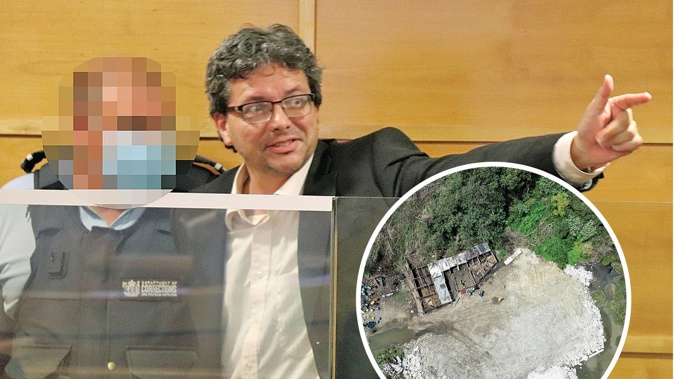
A man who illegally tried to construct his own coastal “park” at Matapihi has failed in his bid to appeal his conviction for illegally reclaiming land and allowing pig effluent to flow into the harbour.
Pig farmer and former Australian political operative Tio Faulkner was jailed in February 2022 for three months and two weeks.
Faulkner claimed his indigenous rights had been “railroaded” and ignored.
However, his efforts - described as “largely unintelligible” - to have his convictions overturned were unsuccessful.
A 2019 aerial survey alerted Bay of Plenty Regional Council to Faulkner’s attempt to reclaim part of the harbour. Further investigations revealed he had dumped nearly 1500 cubic metres of concrete and rebar into the water to extend his seafront property.
He also operated a piggery next door, allowing the faeces from more than 30 pigs to run directly into the water.
After a series of search warrants and abatement notices between 2019 and 2020, Faulkner continued his actions saying he held an “intellectual resource consent” authorising the works, issued to him by the “Tangatawhenua Wealth and Resource Management Authority”, which was not a lawful authority.
The regional council took Faulkner to court for an eight-day trial in July 2021. Faulkner was convicted on six charges relating to illegal earthworks under the Resource Management Act (RMA).
The charges, laid by the Bay of Plenty Regional Council, included unlawfully reclaiming the foreshore, unlawfully disturbing the foreshore, and two charges of discharging faecal bacteria into the harbour.
Faulkner then lodged an appeal with the High Court.
In a written judgment released last month, Justice Paul Davison dismissed Faulkner’s claim that there had been a miscarriage of justice.
In the judgement, Faulkner claimed his rights were “railroaded” and his indigenous rights as owner of the land passed to him by his forebears had been ignored.
/cloudfront-ap-southeast-2.images.arcpublishing.com/nzme/ZO3QKL2ZICGUA6Z5RGNF5DDXRI.jpg)
Tio Faulkner appeared in the Tauranga District Court in January, 2022, facing sentencing on six charges relating to the reclamation of Tauranga Harbour. Photo / Ethan Griffiths
He also claimed Judge Prudence Steven, who presided over his convictions, did not have the legal authority to enforce the provisions of the RMA in respect of Faulkner’s Matapihi land.
Faulkner attempted to support his claim with written statements containing what Judge Davison described as “a discursive range of allegations and obscure legal contentions”.
This included a written requirement calling for “proof of claim” that the regional council had authority on his ancestral land.
However, prosecutor Adam Hopkinson said the evidence clearly established Faulkner was responsible for hundreds of tonnes of hard fill waste being spread from his property and into the harbour. The judge did not err in her conviction of Faulkner.
Hopkinson said Faulkner attempted to file a Writ of Supersedeas, a procedure available in the United States but not New Zealand. Such writs were “largely unintelligible” and irrelevant, he said.
Judge Davison said Faulkner had failed to establish how there had been a miscarriage of justice.
“I respectfully agree ... that there is no principle of Te Tirity o Waitangi/the Treaty of Waitangi that any Act of Parliament is not binding on any person in New Zealand, whether they be Māori or non-Māori. All persons in New Zealand are subject to the rule of law meaning that everyone is subject to the laws enacted by Parliament in the same way,” Judge Davison said.
/cloudfront-ap-southeast-2.images.arcpublishing.com/nzme/YHXDKOIEYBC3JMVVORAC4GZVMM.jpg)
Tio Faulkner dumped around 1500 cubic metres of material into the harbour in an attempt to extend his property. Photo / Supplied
“While there is a generally accepted presumption that statutes are to be interpreted consistently with the Treaty as far as possible, in the present context the application of Treaty principles and tikanga is appropriately undertaken under and within the scope of the statutory scheme.”
Judge Davison said provisions within the RMA made “it clear that the relationship of Māori with their ancestral lands, water, wāhi tapu, taonga, and kaitiakitanga in respect of their lands, are matters that must be taken into account and given recognition by all persons exercising functions or powers under the RMA”.
“By mandating that these matters be recognised ... [there is] no room for the appellant’s contention that this property at Matapihi, and his activities on the land and affecting the adjacent inter-tidal coastal area, are beyond or outside the scope of the RMA.
“I accordingly reject the appellant’s submission that the [regional council] does not have jurisdiction to carry out its functions under the RMA.”
In conclusion, Judge Davison said Faulkner failed to show Judge Steven had erred in her decision to convict, therefore, he failed to show that a miscarriage of justice had occurred, or that there was a risk that his trial was unfair or a nullity.
Faulkner had previously challenged the decision to remand him in custody, during his court process, by filing a habeas corpus claim that he was being detained illegally.
That claim was last week dismissed by High Court Justice Ian Gault.
Take your Radio, Podcasts and Music with you








